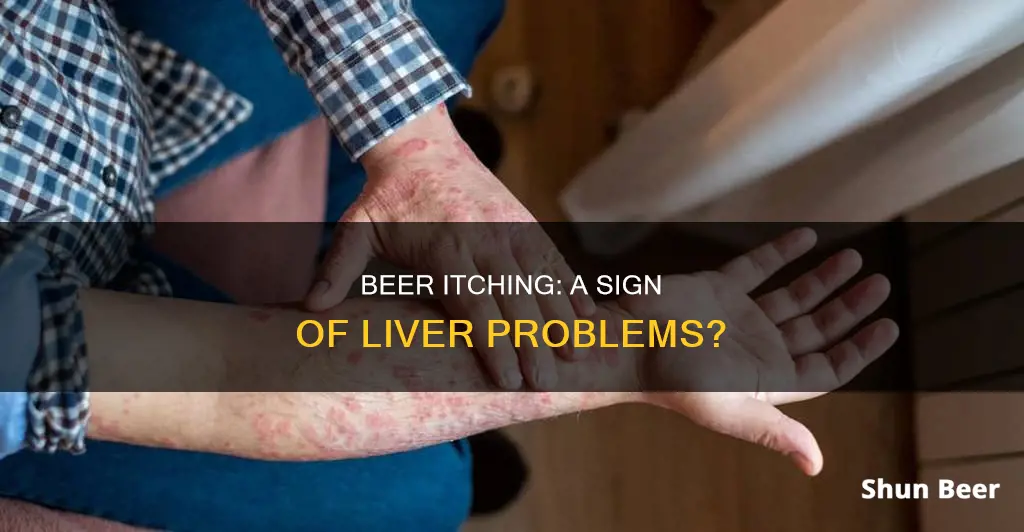
Alcoholic liver disease is a condition that occurs due to alcohol abuse, causing damage to the liver and its function. The liver is responsible for detoxifying blood, producing bile to aid digestion, and breaking down toxic substances like alcohol. When alcohol consumption exceeds the liver's processing capacity, it can lead to a build-up of fat, inflammation, and scar tissue formation, resulting in alcoholic liver disease. While some individuals may exhibit no symptoms, others may experience itching, jaundice, abdominal pain, nausea, and vomiting. It is important to consult a doctor if you experience any of these symptoms, as liver damage can lead to serious complications and even death if left untreated.
| Characteristics | Values |
|---|---|
| Cause of itching | Build-up of poorly metabolised substances that stimulate nerve endings in the skin, such as bile salts, histamine, corticosteroids and opioids |
| Other symptoms | Pain or discomfort in the upper right side of your abdomen, fatigue, unexplained weight loss, jaundice, abdominal pain, nausea, vomiting, fever, redness on the palms of the hands |
| Treatment | Abstaining from alcohol, dietary changes, medications to reduce inflammation, liver transplant |
| Prevention | Abstaining from alcohol, eating a healthy diet, exercising, losing weight |
What You'll Learn

Alcoholic liver disease
The liver has a wide variety of functions, including filtering toxins from the blood, aiding digestion, regulating blood sugar and cholesterol levels, and helping fight infection and disease. When the liver is damaged by alcohol, these functions are impaired. Alcoholic liver disease typically occurs after years of heavy drinking, and the chances of developing the disease increase with the duration and amount of alcohol consumption. It is worth noting that alcoholic liver disease does not occur in all heavy drinkers, and there may be genetic factors that influence an individual's risk.
The early symptoms of alcoholic liver disease may include poor appetite, weight loss, and the appearance of small, red spider-like blood vessels on the skin. As liver function deteriorates, more severe symptoms may develop, such as fluid buildup in the legs (edema) and abdomen (ascites), yellowing of the skin and eyes (jaundice), redness on the palms, and easy bruising. In men, additional symptoms may include impotence, shrinking of the testicles, and breast swelling.
If you experience any of these symptoms or are concerned about your alcohol intake, it is important to seek medical advice. The treatment for alcoholic liver disease involves stopping alcohol consumption, and in some severe cases, a liver transplant may be necessary. With complete alcohol avoidance and time, the liver can sometimes heal and recover some of its functions. However, if the damage is severe, the liver may not be able to return to normal function.
It is important to note that itching after drinking beer may be a sign of alcohol intolerance or an allergic reaction to specific ingredients in beer rather than alcoholic liver disease. Alcohol intolerance is a genetic condition where the body cannot effectively break down alcohol. On the other hand, true beer allergies are rare, but an allergy to specific ingredients in beer, such as grains or additives, may be the culprit. If you experience itching or other uncomfortable symptoms after drinking beer, it is advisable to consult a medical professional for proper diagnosis and guidance.
After-work beer: A harmless habit or a slippery slope?
You may want to see also

Alcohol intolerance
People with alcohol intolerance experience a range of uncomfortable symptoms, including facial redness or flushing, rapid heart rate, headache, low blood pressure, hives, runny nose, and stomach pain. These symptoms can occur quickly after drinking alcohol and can be severe. In rare cases, severe pain after drinking alcohol can be a sign of a more serious disorder, such as Hodgkin's lymphoma.
If you suspect you have alcohol intolerance, it is important to consult a doctor. They may perform a physical exam and recommend skin or blood tests to determine if you have an allergy to a specific ingredient in alcoholic beverages. To prevent uncomfortable reactions, the only solution is to completely avoid alcohol. Over-the-counter or prescription antihistamines may help reduce mild symptoms such as itching or hives.
It is worth noting that alcohol intolerance can lead to major health problems, including an increased risk of cancers of the mouth, throat, oesophagus, stomach, and liver. Regular drinking with alcohol intolerance can also increase the probability of developing heart disease and stroke. Therefore, it is crucial to listen to your body's negative reactions to alcohol and take the necessary precautions to avoid consuming it.
Beer Belly: Can You Drink Without Gaining Weight?
You may want to see also

Allergic reaction to beer ingredients
Beer allergies are rare, but they do exist. If you are allergic to beer, you are likely to experience symptoms similar to those of other allergic reactions, such as abdominal pain, bloating, and chest tightness. These symptoms may start soon after consuming beer or may take a little longer to come on. In rare cases, a severe allergic reaction called anaphylaxis can occur, which is life-threatening and requires immediate medical attention.
If you experience mild symptoms, you may have a beer sensitivity or intolerance rather than a true allergy. This can be uncomfortable, but it is not an immune system response and is usually not as serious. However, it is important to note that even mild symptoms can be a sign of a more severe allergy, so seeking medical advice is always recommended.
Beer contains various ingredients, and an allergy to one or more of these ingredients is the most likely cause of a beer allergy. These ingredients include:
- Malted barley or other grains, such as wheat and sorghum
- Hops
- Colourings
- Flavourings
- Preservatives
- Gluten
- Histamines
- Sulfites
- Yeast
If you have a beer allergy, the best course of action is to avoid drinking beer or choose beers that do not contain the specific ingredient causing your symptoms. For example, if you are allergic to gluten, you may be able to drink gluten-free beer.
To determine whether you have a beer allergy, it is recommended to see a doctor or allergist who can perform allergy testing, such as skin tests or blood tests. They can help identify the specific ingredient in beer that is causing your symptoms, allowing you to avoid that ingredient in other products as well.
Beer and Fishing: A Match Made in Heaven?
You may want to see also

Liver pain after drinking alcohol
The liver is responsible for processing alcohol, but it can only handle a small amount at a time. When a person drinks, alcohol is absorbed into the bloodstream via the stomach and small intestine. Once in the liver, alcohol creates an enzyme called acetaldehyde, which can harm liver cells and lead to irreversible scarring.
If you experience liver pain after drinking alcohol, it is important to consult a doctor. They may perform a biopsy or a blood test to assess liver function and any damage that may have occurred. The most effective treatment for liver pain after drinking alcohol is to stop drinking. Studies show that abstaining from alcohol can help individuals recover from early-stage alcohol-related liver complications.
In addition to abstaining from alcohol, there are other lifestyle changes that can help treat liver pain, such as eating a healthy diet, exercising, and losing weight. For severe cases of liver damage, a liver transplant may be needed.
Millenials' Beer Consumption: A Changing Taste Perspective
You may want to see also

Alcohol-related liver damage
Alcoholic liver disease is liver damage caused by overconsumption of alcohol. The liver is the primary site of ethanol metabolism, and heavy drinking over time can lead to a wide spectrum of hepatic lesions, including steatosis, hepatitis, and fibrosis/cirrhosis.
Stages of Alcoholic Liver Disease
Steatosis
Steatosis, or fatty liver, is the earliest and most common response to heavy drinking, occurring in more than 90% of problem drinkers. It is characterised by the deposition of fat in hepatocytes and can be reversed if the individual abstains from alcohol.
Alcoholic Hepatitis
Alcoholic hepatitis is a more severe form of liver injury, characterised by swollen, dying hepatocytes and the development of tangled aggregates of insoluble proteins called Mallory-Denk bodies within hepatocytes. This stage can occur after many years of heavy drinking or during periods of binge drinking. It can lead to life-threatening complications and usually progresses to cirrhosis if the person continues to drink.
Fibrosis and Cirrhosis
Fibrosis refers to the deposition of abnormal amounts of extracellular matrix proteins, primarily by activated hepatic stellate cells. Cirrhosis is the late stage of hepatic scarring, characterised by excessive liver scarring, vascular alterations, and eventual liver failure. This damage is irreversible, and the only treatment option may be a liver transplant.
Risk Factors for Alcoholic Liver Disease
- Gender: Women are more susceptible to alcohol-related liver damage than men due to higher blood alcohol concentrations and lower capacity to oxidise ethanol in the gut.
- Age: Older adults are more vulnerable to ethanol-induced impairments.
- Genetics: Genetic and epigenetic factors govern the initiation and progression of alcoholic liver disease.
- Obesity: There is a correlation between alcohol consumption and the risk of liver damage in people with a high body mass index.
- Smoking: Cigarette smoking is associated with a higher risk of alcoholic cirrhosis.
- Viral Infections: Alcohol abuse worsens the course of hepatitis C and hepatitis B viral infections, leading to rapid progression to fibrosis, cirrhosis, and liver cancer.
Treatment and Prevention
The first step in treating alcoholic liver disease is removing alcohol from the diet, which can help reverse some early stages of the disease. Cognitive behavioural therapy and medications can ease withdrawal symptoms, and ongoing therapy may be necessary to prevent relapse.
Nutritional supplements and a healthy diet are also recommended, as deficiencies in micronutrients and minerals often occur in alcoholic liver disease.
For severe alcoholic liver disease, a liver transplant may be the only treatment option. Abstinence from alcohol is crucial to prevent further damage and improve liver function.
Beer and Plasma Donation: Is It Safe?
You may want to see also
Frequently asked questions
The early stages of alcohol-related liver disease often have no symptoms. However, if symptoms are present, they may include pain or discomfort in the upper right side of the abdomen, fatigue, or unexplained weight loss.
If you're allergic to beer, you'll probably experience symptoms similar to those of other allergic reactions, such as abdominal pain, bloating, and chest tightness.
Alcohol intolerance is a genetic condition where the body can't break down alcohol efficiently. It can cause immediate, uncomfortable reactions such as a stuffy nose and skin flushing.







